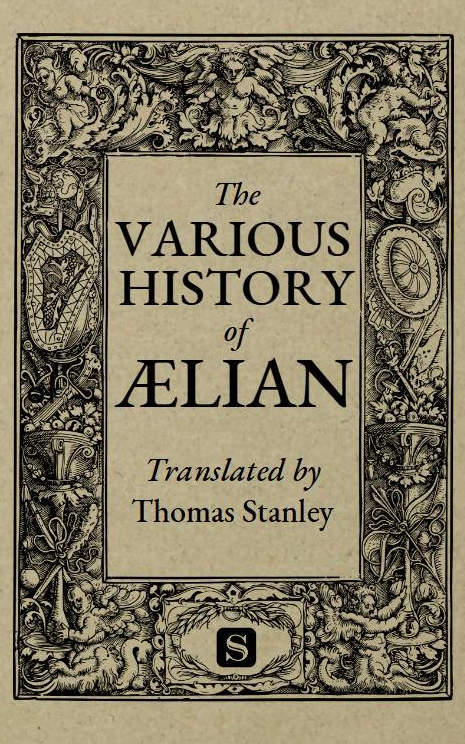Once again Serif Press brings us a new edition of a delightful old book, and once again an introduction, which we reproduce here, is provided by H. Albertus Boli.
It seems that there were two well-known classical authors by the name of Ælian, and literary historians are generally agreed that this one was not that one but the other one. Our Ælian, Claudius Ælianus, lived about the year 200. He was a Roman, but a Hellenophile; he wrote in Greek, and was praised in his time for his pure Attic style. His love of Greek history and Greek thought comes through in every story. He was a miscellanist: his other famous work, On the Nature of Animals, is a collection of odd facts and observations (collected from books, not by observing the animals), again flung together without much system.
Modern readers find themselves more in sympathy with Ælian than with many other classical writers. He is human in a way that some of the best writers of his time are not. He has prejudices we can sympathize with. He thinks infanticide ought to be illegal, though Thebes is the only place he can think of that has such a law. He thinks forgiveness is a splendid virtue. He prefers mercy to justice, but is especially pleased when a wise ruler finds a way to have both of them at once. He thinks animals can be remarkably clever. He likes a story of remarkable wonders, but he is quick to point out that it probably isn’t true. Ælian, in short, is just the sort of guest you would like to have at a party of intellectual friends today.
As for his stories, some of them may preserve facts of history otherwise unknown to us. Many of them are probably not true, in the limited and uninteresting sense of not corresponding to the actual events that happened in the real world. They are true, however, in the much more important sense that they bring to life what the Greeks and Romans believed about themselves. They may not tell us what happened in ancient times, but they make the ancient world present to us in the same way it was present to people in the Roman Empire of the year 200 or so.
And now a word about our translator. Thomas Stanley’s translation is doubtless imperfect, as any translation must be; he leaves out some of the parts that were more embarrassing to a gentleman of 1665 (we have supplied those parts in footnotes from the earlier Fleming translation); occasionally he may misunderstand his author, though very seldom, and probably no more than most of the best translators. With its few flaws, however, this is a very good translation, and a good model of what translations of classical literature ought to be. This was in fact the last English translation of Ælian’s Various History published for more than 300 years; not until the 1990s was the book translated again.
It is worth noting, therefore, that the author of the standard English translation of the Various History was no more than fourteen years old when he wrote it. The younger Thomas Stanley was born in 1650; his Ælian was printed in 1665. According to the dedication, his father, the elder and much more famous Thomas Stanley, had set him the task. Now you see why the commendatory verses make so much of the author’s youth:
If from a Glorious Morn we justly may
Take a Prognostick of th’ ensuing Day;
What do these early glories promise, when
You shall arrive at your Meridian?
To which we may only say, Prognostick schmognostick. This translation is the only thing for which the younger Stanley is known. History is even ignorant of when he died; since we have no other works by him, he may have died young. As a memorial to him, we have reproduced two of the three commendatory verses in this edition. One of them is by Edward Sherburne, a distinguished poet of the second rank who was capable of a memorable turn of phrase:
Not to know what was done ere we were born,
Is to live Children still…
The third poem is written in Greek and printed with every arcane ligature in the compositor’s arsenal; we have omitted that one.
The Stanley translation has the virtue of making Ælian live in English, more so than the earlier Fleming translation. It keeps up a conversational style that is perfectly appropriate to the author. We have kept the original 1665 spelling and capitalization; the only thing we have changed is the use of italics, which (as was common for the time) are used in the original edition for all proper names, a convention modern readers might find distracting. Stanley adds a few judicious notes, which we reproduce here. We have added very few of our own. There may be references a modern reader will not recognize; but most of the stories stand as they are, and to weigh down the pages with footnotes would have produced an effect completely opposite to the cheerful entertainment of the original.
You probably have an Amazon gift card burning a hole in your pocket right now. Everyone has: it is nothing to be ashamed of. Whittle down that outstanding balance with Aelian’s Various History. Or consider one of the other Serif Classics, handsome editions of old books worth rediscovering. Or, if your tastes run to the modern in literature, you may wish to stock up on the works of H. Albertus Boli.
